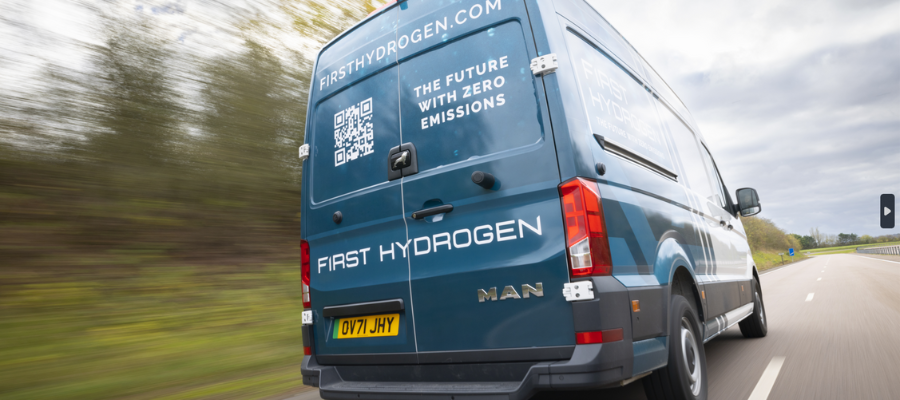🕒 Article read time: 2 minutes
First Hydrogen to drive UK parcel delivery into the future

Following successful initial fleet operator road trials in the UK, zero emission automotive and green energy developer, First Hydrogen, has decided to open up fleet trials for its hydrogen-fuel-cell-powered vehicle (FCEV) in response to growing interest from parcel delivery companies.
The company’s proof-of-concept demonstrator vehicles are planned for operational trials with several parcel delivery companies looking to enhance their growing greener fleets starting late Q3 and Q4 of this year.
Parcel delivery companies face a specific set of challenges, which is encouraging them to explore other zero emissions technology in addition to battery technology to meet commercial and environmental targets.
These fleets make up the middle and final stages of the supply chain, which traditionally handle shorter journeys to transport items from local hubs directly to consumers or end users.
They are increasingly undertaking longer routes from distribution centers to lockers and shops with parcel collection services or “pick up and drop off points”.
With fewer stops, the locker model creates two thirds less carbon than conventional home deliveries, which could be reduced further when using greener vehicles1.
Steve Gill, CEO of First Hydrogen Automotive, comments: “Carbon reduction targets, low and zero emission zones in cities and phasing out of diesel and petrol-powered vehicles are positioning hydrogen mobility as a realistic solution to the challenges last-mile delivery operators face.
“Fleet managers are realising that battery electric vehicles (BEV) alone will not provide the reliability and operational flexibility required to meet customer demands.
“Future fleets require a mix of BEV and FCEV to overcome these obstacles and hit net zero targets.
“The large, growing parcel delivery sector desperately needs to build environmentally friendly and commercially viable fleets, and our hydrogen LCV can help to do that.”
*www.logistics.org.uk/campaigns
Published On: 31/08/2023 16:00:00

Comments Section
If you are a Logistics UK member login to add comments.
In brief
Changes to GVMS requirements for Authorised Consignors
Are you or do you work with a UK Authorised Consignor? An authorised consignor is a person authorised to carry out transit operations without presenting the goods at the customs office of departure.
Changes to the requirements for providing information on GVMS (Goods Vehicle Movement Service) in relation to the Transit Accompanying Document Movement Reference Number (TAD MRN) came into effect on 1 August 2023.
It is now a requirement for all DUCR (Declaration Unique Consignment Reference) numbers that may be covered under the TAD MRN to be included on the GMR (Goods Movement Record). This will ensure that consignments are presented correctly for customs processing. Any Authorised Consignors who rely on the hauliers they use to raise the GMR, need to be aware of these changes.
If you are an Authorised Consignor who holds one of the following authorisations and you are moving the goods in accordance with those authorisations, you can still use the TAD MRN. This is because the additional processes confirm that all the goods have been presented correctly for customs processing.
- Customs Supervised Export (CSE)
- Designated Export Places (DEPs)
- Internal Temporary Storage facilities (ITSFs), or
- Export Memorandum of Understanding (MoU)
For further guidance, please contact HMRC Transit Policy transitpolicymailbox@hmrc.gov.uk including “GVMS Input Requirements” in the subject line.
Latest articles
Generation Logistics Case Study
Niall Delargy, Senior Marketing Executive – Motia.
Read time: 2 minutes
View article
Member notice: Do you need to apply for an IVA for your vans and light goods vehicles?
Apply for Individual Vehicle Approval (IVA) if you're making or importing a very small number of vans or light goods vehicles (also known as IVA 1LG).
Read time: 2 minutes
View article
Thames’ biggest port launches new commercial vehicle charging hub
Fleete has unveiled its first major project in the UK with the development of a dedicated commercial vehicle rapid electric charging hub, believed to be the largest in the country.
Read time: 3 minutes
View article